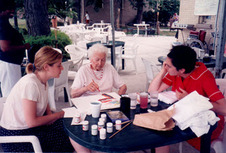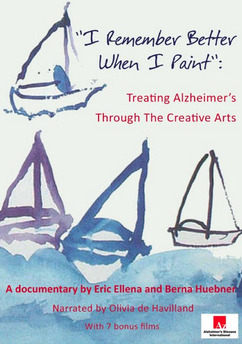 Hilgos, who had Alzheimer's, painting with art students. Engaging in creative arts reopened doors of communications and improved her quality of life.
Hilgos, who had Alzheimer's, painting with art students. Engaging in creative arts reopened doors of communications and improved her quality of life. Did you know that Alzheimer’s is the only disease in the top ten causes of fatalities without a prevention, treatment or cure? And that in the United States, there are more than 15 million Alzheimer's and dementia caregivers? The disease was first noted over 100 years ago by German physician Aloysius "Alois" Alzheimer. Today while researchers are making strides towards learning more about the mechanisms of this disease, it seems we are still nowhere close to finding a treatment. What recourse can people take?
A powerful documentary which broadcasts on public television stations nationwide in October and November 2015 provides inspiration and hope.
Berna Huebner serendipitously discovered one way to tackle Alzheimer’s—through the power of the creative arts. In 1995, her mother Hilda Gorenstein (an artist also known as Hilgos) was moved to a Chicago-area nursing home because of steadily worsening Alzheimer’s. She stopped communicating and became a part of the stigmatization, solitude and isolation that is connected with this disease. The staff at the nursing home commented that her “lights were out.”
Berna was visiting her mother one day, and had the idea to ask her mom if she’d like to paint. Hilgos, who had been uncommunicative for some time, looked at her daughter and had an astonishing reply: “Yes, I remember better when I paint.”
Having been told of this amazing moment, her mother’s doctor suggested that art students engage in painting with her mom. Back in the 1990s, this was an innovative and pioneering idea.
It turns out that the lights were not out. Berna was amazed to see her mother’s steady improvement, in both speech as well as physical mobility, thanks to the use of art and creativity. The engagement in the creative arts reopened doors of communications, and improved the quality of life for Hilgos.
Since her mother’s passing in 1998, Berna has been committed to raising awareness of the positive impact of the creative arts on people with Alzheimer’s and is co-director of a documentary film inspired by her mother’s words which is set to broadcast nationwide on PBS in November 2015. [Click here for broadcast listings.]
As noted in the documentary’s information page: I Remember Better When I Paint, narrated by legendary Academy award-winning actress Olivia de Havilland, is the first international documentary about the positive impact of art and other creative therapies on people with Alzheimer’s and how these approaches can change the way society looks at the disease.
Leading doctors and neurologists explain how parts of the brain can be spared and discuss the life-enriching benefits of these new approaches. Among these experts are Dr. Robert Butler, a founding director of the National Institutes on Aging (NIH) and a Pulitzer Prize-winning author, Dr. Samuel Gandy of Mt. Sinai School of Medicine, Dr. Robert Green of Brigham and Women’s Hospital and Harvard Medical School and Dr. Robert Stern, Professor of Neurology at Boston University.
Inspiring personal stories are featured, including that of Rita Hayworth, as told by her daughter, Yasmin Aga Khan, to highlight the transformative impact of art and other creative therapies and how they are changing the way we look at Alzheimer’s.
“I Remember Better When I Paint” is co-directed by Eric Ellena and Berna Huebner, and is a French Connection Films and Hilgos Foundation production. View the trailer to the film here.
The film is also available on DVD and includes a series of short supplemental films that further highlight special programs and flesh out the how-tos of organizing an outing, a creative workshop or recreating social bonds between people with Alzheimer's and their families.

 RSS Feed
RSS Feed
